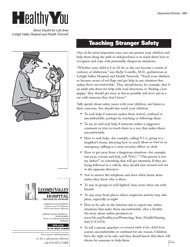One of the most important ways you can protect your children and help them along the path to independence is to teach them how to recognize and cope with potentially dangerous situations.
“Whether your child is 8 or 18, he or she can become a victim of violence or abduction,” says Kelly Costello, M.D., pediatrician at Lehigh Valley Hospital and Health Network. “Teach your children to become aware of red flags and get help in any situation that makes them uncomfortable. They should know, for example, that if an adult asks them for help with road directions or ‘finding a lost puppy,’ they should get away as fast as possible and never get in a car with someone they don’t know.”
Talk openly about safety issues with your children, and listen to their concerns. You should also teach your children:
- To seek help if someone makes them scared, confused or uncomfortable, perhaps by watching or following them
- To say no and seek help if someone makes a suggestive comment or tries to touch them in a way that makes them uncomfortable
- How to seek help—for example, calling 9-1-1, going to a neighbor’s house, knowing how to reach Mom or Dad in an emergency, talking to a store security officer or clerk
- How to get away from a dangerous situation—for example, run away, scream and kick, yell “Fire!,” “This person is not my father!” or something that will get attention. If they are being followed in a vehicle, they should turn around and run in the opposite direction.
- Not to answer the telephone and door when home alone unless they know who is there
- To stay in groups in well-lighted, busy areas when out with friends
- To stay away from places where suspicious activity may take place, especially at night
- How to be safe on the Internet and to report any online situations that make them uncomfortable. (See a Healthy You story about online predators by clicking here)
- To tell a parent, guardian or trusted adult if the child feels scared, uncomfortable or confused for any reason. Children have the right to be safe, and they should know that there will always be someone to help them.

